U.S.
Survivors of 2017 church massacre endure lifelong disability and trauma
The Washington Post March 31, 2023
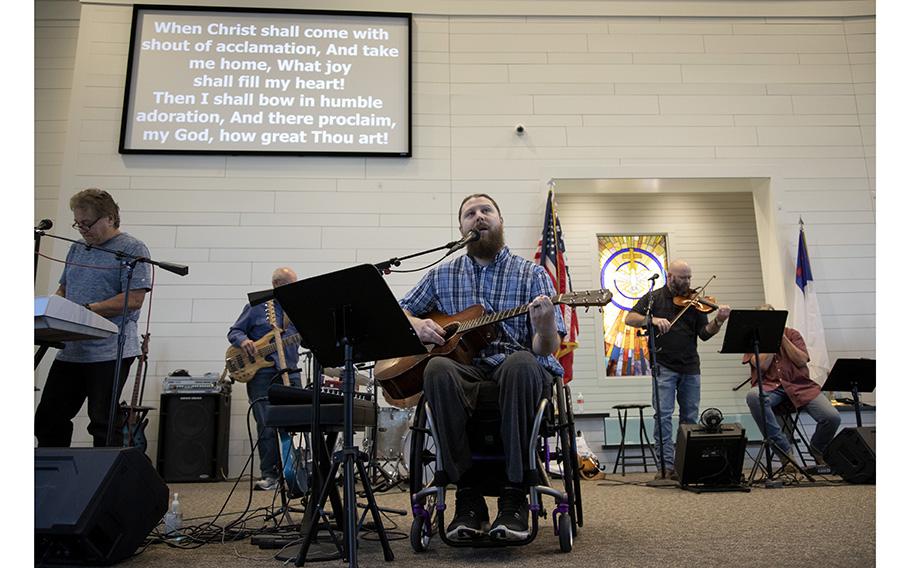
Kris Workman leads a song during the Sunday service at First Baptist Church of Sutherland Springs on Sept. 25, 2022. Kris was paralyzed in the 2017 shooting. (Lisa Krantz for The Washington Post)
SUTHERLAND SPRINGS, Tex. - Multitudes of purple freckles dot Morgan Workman's legs, arms, chest and cheekbone - tiny shards of metal from bullets and shrapnel that struck her as she worshiped in her church more than five years ago.
The fragments are leaching lead. Workman suffers from toxicity symptoms, including body pains, fatigue, depression - and has been told by doctors that she probably can't have a baby.
"It feels like it was yesterday, like we're still going through all of it," Workman, 25, said. "Very uncommonly does a Sunday go by that I don't think: 'What if? How would I get out? Would I get out? Would I be able to do something?'"
Workman was shot twice when a gunman opened fire in the First Baptist Church of Sutherland Springs, slaying worshipers gathered for Sunday service. More than two dozen of her fellow parishioners and closest friends died in the Nov. 5, 2017, attack.
Twenty others were wounded, sentenced to lives of unending pain and illness.
David Colbath, shot nine times, has high levels of lead in his blood. He can barely stand or use his hands without pain. Kris Workman, Morgan's brother-in-law who was shot twice, was paralyzed from the waist down and told by doctors he'd probably never walk again or conceive children.
John Holcombe and his now-12-year-old daughter, Evelyn, cling to each other for support. His pregnant wife, Crystal, had shielded Evelyn from the gunman and was killed along with Evelyn's three siblings and grandparents.
Some of the survivors have moved away from Sutherland Springs. Some have contemplated suicide.
The physical impact of the bullets and the number of lives lost were magnified by the shooter's chosen weapon. Devin Patrick Kelley, wielding a Ruger AR-556 rifle, fired 450 military-grade bullets inside the church within minutes, all of which left the barrel at a velocity of around 3,200 feet a second.
Air Force veteran Devin Kelley. (Texas Department of Public Safety)
The devastation was incomparable to damage from a handgun or shotgun. Doctors who treated the victims likened the wounds to something they might have seen on a battlefield.
"The high-velocity firearm injuries, when they come in, you're missing body parts, and there's bleeding," said Lillian Liao, a trauma surgeon at University Hospital and UT Health in San Antonio. "You don't see muscle. There's just bone and skin and missing parts."
Five years on, many in the working-class town of 600 - nestled in the dusty-road countryside an hour southeast of San Antonio - still attend services every Sunday. They pray in a new church built next to the old one. The sanctuary, funded by donations from around the country, has fortified walls and security cameras. Many of the congregants - in addition to those in the church's new security team - carry guns on their hips for protection.
Every Sunday, they chime a bell in the church's tower where 25 portraits of those lost hang high, along with an image of angels to honor Crystal's unborn child. Children hobble through the pews with leg braces, men carry colostomy bags that sometimes leak. Some, like Workman, are marked by sprays of odd-looking freckles.
In the years since the shooting - years of weekly doctor's appointments, therapy to cleanse her blood and severe bouts of depression - Morgan Workman has been, in the words of a co-worker, "an island of hope in a sea of despair." She clings to that. Not because she believes it to be true, but out of hope that one day it could be.
"I want to be the person that's happy and positive even if they're struggling. I want to be smiling even if I'm having a really hard day. I want to find what's good in the day," Workman said. "But some days, the birds, the breeze - that's all you can find."
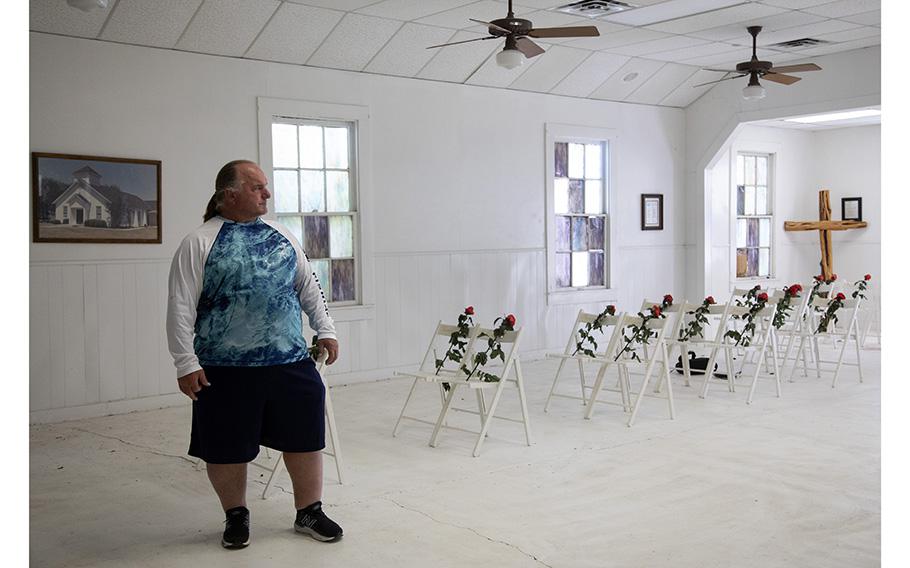
David Colbath visits the church where he was shot nine times, which is now a memorial. Chairs with roses honor the people killed in the massacre. (Lisa Krantz/for The Washington Post)
As David Colbath's blood pooled on the church's red carpet, as his friends were shot and killed around him - he thought of his children, and his savior.
Eyes shut, he recalled whispering again and again: "I love you Morgan, I love you Olivia, I love you Jesus."
The first gunshots sounded like fireworks.
On the lawn, 26-year-old Kelley - clad in body armor, his face concealed by a mask of the Marvel character the Punisher - was firing his rifle at the outside walls and front door of the tiny church.
Colbath was one of the first people to be hit, catching a glimpse of the shooter from the church entranceway before his arm was shot. "Get down!" he recalled screaming. "Get on the floor!"
As parishioners ducked for cover, Kelley stormed the church and stalked the aisles, shooting people at point-blank range. He fired 196 times inside the church in 16 separate bursts, according to a report based on recovered bullet casings and analysis of a church video. The dead ranged from age 1 to 77.
Terry Snyder, a longtime Texas Ranger among the first on the scene, later described seeing victims where bullets had "disintegrated the skull" - including a toddler's. Testifying in a civil trial, Snyder twice choked up on the witness stand.
"Even the survivors, the wounds that I saw . . . it was unbelievable, just the damage that the bullet would cause," Snyder said.
In testimony as part of a lawsuit against the U.S. Air Force for failing to report Kelley's criminal history to the FBI, John Holcombe described the horror he saw when he emerged from the sound booth.
"The kids were just laying there piled up with their faces blown off," Holcombe testified. "I couldn't even see [Crystal's] beautiful face anymore. It was just a crater."
Rusty Duncan, a paramedic from a neighboring town who happened to be driving by and was one of the first responders to enter the church, recalled "walking into a war zone where everyone was already dead."
"It looked like a bomb went off in there," Duncan said. "Just pieces of people everywhere."
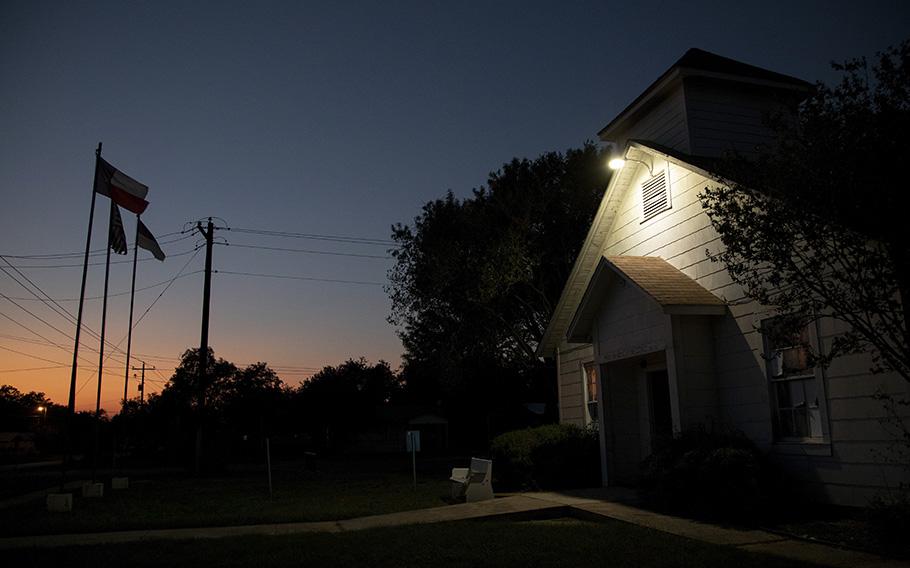
Dusk falls over the original building of the First Baptist Church of Sutherland Springs, which was turned into a memorial after the 2017 mass shooting. (Lisa Krantz/for The Washington Post)
Kelley fled the scene and killed himself hours later. Police later said they believe the gunman was targeting some relatives who attended the church because of an ongoing "domestic situation." One of the relatives, his mother-in-law, Michelle Shields, was not at church that day, but her mother, Lou White, was. She was killed.
The past is so precious to Holcombe that he has frozen time.
A wastebasket filled with Crystal's crumpled papers and empty Dr Pepper cans still sits on one side of his bed. He's kept a foam Polar Pop cup, lid and straw intact; it was the last drink she sipped on. The registry for the baby they never had is still online.
"One of the most important things we have is time," he said on a recent afternoon. "I regret not spending more time with the rest of my family when they were here. That's something I can never get back."
Holcombe lost both of his parents in the attack. His brother and niece were also killed. Only Evelyn, his youngest daughter, and Philip, his oldest son, survived. Holcombe wasn't shot, but fragments of shrapnel were lodged in his back and picked out later at the hospital. Evelyn, 7 at the time, was saved by her mother, who threw herself on top of her.
Holcombe has never stopped questioning why he survived instead of the other members of his family. "It would be better if I had gone and Crystal would've stayed," he said.
He can't dwell for too long. He has an energetic, wild-haired middle-schooler to feed and entertain and put to bed every night. Evelyn pulls him into the present in the moments when he smells Crystal's purple robe for too long, willing her scent to return to the fabric.
"Daddy, grab my feet!" she called to him on a recent afternoon, interrupting him as he examined the faint crayon writings of Megan and Emily, her deceased sisters, on the living room blinds.
Evelyn lay on a blue blanket on the living room floor, her blond hair splayed around her as she pushed her feet out into the air so that he could pull her around like a human mop.
"Woo hoo!" she said as he did. Soon, Philip would come home from work and be her next target for attention.
Later, John confessed: "If they weren't here and it was just me - I would be gone."
Evelyn loves Subway sandwiches that ooze with mayo and bounding on her trampoline in the backyard. Her mind wanders quickly from subject to subject.
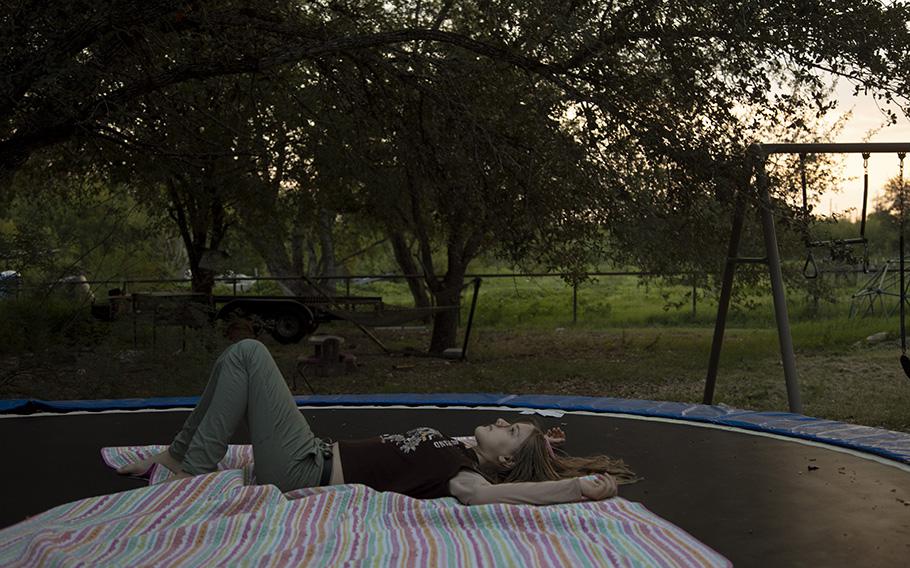
Evelyn Hill, 12, after jumping on the trampoline at her home in Sutherland Springs, Tex., on Sept. 9. (Lisa Krantz/for The Washington Post)
But she can talk almost encyclopedically about mental health and depression.
"People don't know how to handle their depression," Evelyn said on a recent afternoon. "Depression isn't just a feeling, and you can't just snap out of it. It's like . . . a hatred that's sucking inside of you and you have no happiness, no joy, and you don't know what to do, you're lost."
After losing three siblings and her mother, she struggles to imagine herself as an adult. When John was explaining that he saved Evelyn's Hello Kitty playhouse - a gift from her mother - because she might want it when she gets older, Evelyn interjected. "I don't think I'll grow up," she said.
She shivers at loud noises. When Evelyn attended a church sleepover on a recent Friday with a handful of other girls, she ran up to another parishioner who survived the shooting and cupped her hands over her ears silently, her eyes pleading: She wanted earmuffs to dull the sounds of the other girls' loud screaming.
On the day of the shooting, Evelyn was found underneath her mother. She was covered in so much blood and body matter that a rescuer initially thought she might be dead.
Over the years, Evelyn has slowly opened up to Holcombe about what she saw and heard that day - how Evelyn locked eyes with Kelley and heard her mother's pleas for mercy. "One thing that she shared with me was that Crystal begged Kelley not to kill the kids," Holcombe testified at trial. "And so he shot them . . . in front of her. He shot them first."
Crystal was a gardener and an animal lover, Holcombe said. Holcombe bought Evelyn three baby white Pekin ducks for her birthday. When one got hurt, he drove from vet to vet, emptying his wallet and gas tank to try to save it. He wants his children to know that life is sacred, even though they've grown up around so much death.
Evelyn takes home-schooling classes online, which allows the Holcombe family to travel. In the past year, they have gone to Redwood National and State Parks, Mount Rushmore and Wyoming's Devils Tower National Monument.
Next, Evelyn wants to see a big waterfall and visit a Brazilian cocoa farm. So John is spending his time after work looking up places where they can do that.
"My main thing in life," he said, "is for her to be happy despite all the hell she has been through."
Colbath was shot nine times in the arm, leg and back.
He recalled needing six surgeries in the weeks after the shooting, as doctors decided which bullet fragments to remove, and which were buried so deep they were better left inside him. In the years since, bullets were also removed from his left side and back.
When he returned home from the hospital, Colbath could no longer do simple tasks independently. He had to submit to being cared for and asking for help, his family and health-care workers tasked with changing the bandages covering gruesome wounds on his buttocks and back.
One of his arms is numb, with a chunk of flesh cut out from his forearm and knotted skin stretching across it. The other hand is hypersensitive, with frequent nerve pain and uncomfortable sensations at the slightest touch. His ankles have scars from bullet wounds and are often swollen, preventing him from standing too long. His lead levels are above average, he said.
Colbath, now 61, gained more than 65 pounds after the shooting, and he had a gastric bypass procedure in December to help manage his weight. In the first year, his injuries prevented him from working as a fence repairman, and sky-high medical bills meant he had to rely on donations from the church and friends to get by. He no longer receives money from the state's victims' crime fund, he said, and hasn't applied for disability payments from the government.
He takes eight to 12 ibuprofen pills a day, he said, in addition to a handful of Tylenol at night.
"I've normalized pain every night. I've normalized pain every day," he said recently. "I'll never be normal again."
Brief moments of terror interrupt his daily life; unexpected loud noises send him into a tailspin of fear. He has struggled with the guilt of having been unable to stop the gunman. "I've had a really hard time in being able to overcome not being able to do anything," he said. "You grow up as a man's man and you think you can conquer the world, maybe. And it's amazing how one bullet hole in your arm stops you from doing everything."
Despite his struggles, Colbath has continued to attend First Baptist Church, the center of his social life in the town. Three years ago, he married Sheri Kay, a fellow parishioner who lost her nephew and niece - Robert and Shani Corrigan - in the attack. They wed in the church's new building.
"In spite of everything that I've been through, I have a big joy in my heart, not a big hole," Colbath said. "When I wake up, I am smiling and happy. And that's not a joke - that's the absolute truth. I believe the Lord has given me that and said, 'You've got another chance, what are you going to do with it today?'"
A nurse slowly inserted a needle into Morgan Workman's arm, funneling a mixture of vitamins into her bloodstream. Workman receives this treatment every week to help with her lead levels and takes nearly 30 pills daily to manage her symptoms.
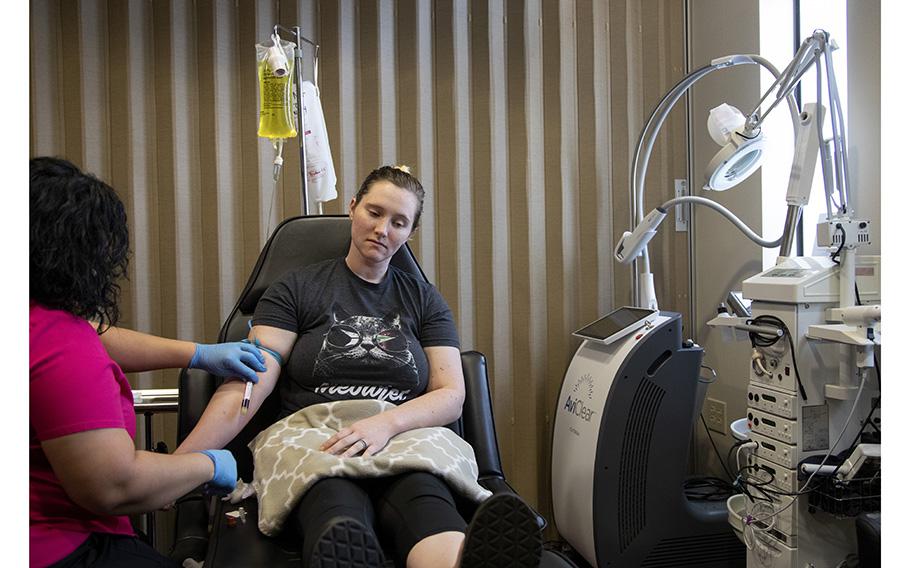
Morgan Workman gets IV therapy to help with the effects of lead poisoning from the shrapnel that remains embedded in her body, with nurse Patricia Sanchez. (Lisa Krantz/for The Washington Post)
"I'm still always at the doctor's," she said as the yellow-green liquid began to flow.
Workman developed problems with her feet soon after the shooting from the lead in her system, she said, and she relied on various leg braces for years until 2021. She still suffers from piercing headaches, sustained dizziness and an inability to sleep through the night.
In the first couple of years after the shooting, Workman's metal toxicity levels were dangerously high, she said. Doctors put her on a chelator, which filters out lead from the blood. As part of the treatment, doctors drew between 16 and 30 vials of her blood every Friday. The treatment required her to go through an intense diet; she lost 40 pounds.
When her symptoms were still not improving, Workman stopped the chelation and began an alternative treatment.
The lead in her body is also detrimental to fetal development, several doctors told her. As a result, Workman was advised not to have children with her husband of four years, Kyle Workman. They yearn for a future they cannot have.
"I almost feel like I'm mourning that loss," Morgan Workman said. "People describe how you have this incredible connection with this child because it's in your body, you can feel them moving, you can feel them kick. . . . It's never going to be something that's not hard to deal with."
Kyle is a survivor, too. During the shooting, he found a moment to flee the church - the only congregant to do so - racing across the street to the gas station, his shirt splattered in blood. The store owners opened the locked door for him and he ran in before collapsing to a crawl and sliding up against the back wall, in shock.
"Almost any little thing can bring me back to it. Gunshots still, loud noises still, funerals still. There's a lot that can bring me back to five years ago," Kyle Workman said.
Both Kyle and Morgan live like that together, jolted by the thud of a forklift or the sound of a critter digging under their house. Snippets of music remind them of their closest friends who were murdered. And a court case requires them to recount and relive the day of the shooting again and again.
The couple got married about two months after the shooting. They left empty chairs at their wedding for six guests who were killed.
Every Monday, they join their sisters and brothers at her parents' mobile home to cook a meal together. The trailer is the church's old youth room. It was put up for sale after the shooting because the new church includes the space.
It still has the faded blue carpet from back then, with stains from iced tea spilled by children who are now dead. Stickers on the restroom doors were placed there by Karla Holcombe, who was killed.
And there are two bullet holes: one visible on the outside, a green arrow drawn by first responders pointing to it. Another is at the bottom of a window, its spiderweb of fractures covered up with neon green tape.
"It's a little strange" living in that space, said Unitia "Nish" Harris, Morgan Workman's mother, as she looked around at their living room, a pew from the old church resting along one wall.
Morgan Workman talked and joked with her siblings and brothers-in-law as she ate an egg roll bowl, a tattoo of the badge number of the first responder who had found her the day of the shooting just visible on her ankle.
"I'm glad that I had dinner with my family. Before I left the house I was just, I was struggling," Workman said teary-eyed after the meal. Her family, she said, has saved her. "It's a really, really big blessing to have that and to have gone through hell and high water together and know that everybody has each other's backs."
On Sept. 25, Pastor Frank Pomeroy, who had led services at the First Baptist Church of Sutherland Springs for more than 20 years, and who held the congregation together during the biggest tragedy of their lifetimes, took to the pulpit one last time.
The service, weeks before the shooting's five-year anniversary, would be his last one as pastor before retirement.
He wore a light blue collared shirt and one of his signature quirky ties - this time, his Winnie the Pooh and Tigger one. Sherri Pomeroy sat proudly in the front row, tears in her eyes and overwhelmed by the significance of the moment.
It had taken years for the horror of the shooting to catch up with Sherri. The couple were not at church that day. Frank had been in Oklahoma City, taking a firearms class, and Sherri had been in Florida working for the Federal Emergency Management Agency. Their 14-year-old daughter, Annabelle, was there. She was killed.
In the hours and days after the attack, the Pomeroys had little time to grieve. They served as spokespeople for mourning families and de facto mental health counselors. They distributed donations and fended off conspiracy theorists who approached the church with cameras claiming that the shooting was a hoax.
They were so busy that their family frayed. At one point, their five surviving children told them: "'We didn't just lose Annabelle, we lost y'all too,'" Sherri said.
The Pomeroys said they struggled to help their family and friends through a tragedy that had occurred when they were out of town. They said they wondered if they could have saved their daughter if they had been at the church that day - and they questioned why God would allow her to be killed while sparing them.
About three years after the shooting, Sherri wanted to end her own life.
"I was suicidal," she said. "I didn't want to struggle to get out of bed or do anything anymore. I just wanted to succumb."
Immediate intervention from her husband and close friends coupled with group therapy helped her mental health. But when Frank had his own health scare last year, the couple decided they would step away from church leadership, sell their things and move into a camper to travel. It was time to let themselves heal.
All around them on their final day leading the congregation were the survivors.
The worship band performed as it always had, with Kris Workman at the helm. Guitar propped on his lap, legs settled on his wheelchair's footrests, he bellowed the lyrics: "Death is swallowed up forever by the fury of your love."
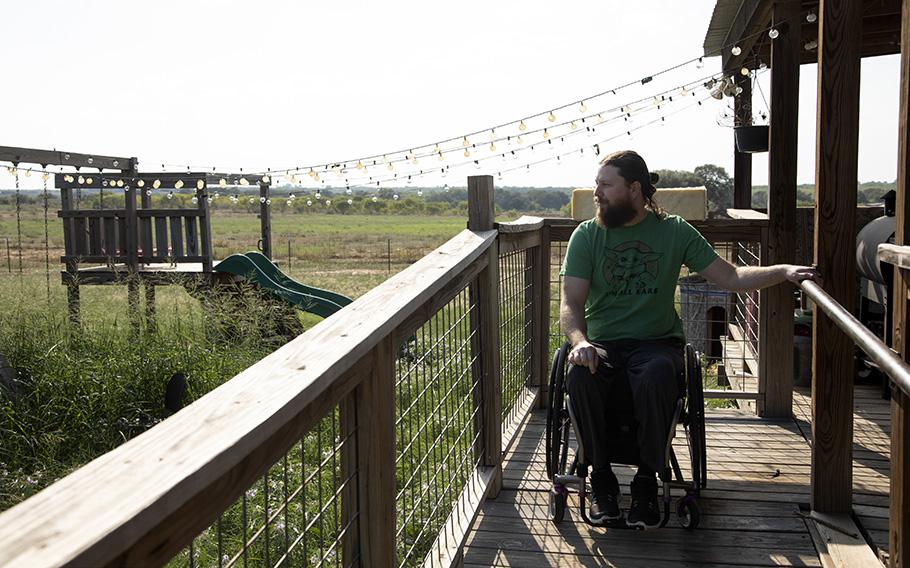
Kris and Colbey Workman’s home was renovated after the shooting to accommodate his wheelchair, but Kris still struggles to fit into his 8-year-old daughter’s room to kiss her goodnight. (Lisa Krantz/ for The Washington Post )
David Colbath sat a few rows from the front, smiling with his eyes closed as he held hands with his wife, Sheri Kay Colbath.
In the back, John Holcombe fiddled with his computer, monitoring the church services' various live streams online, smiling as Evelyn rushed by him with three other girls. They made their way to the front of the pews where she knelt and prayed.
Morgan Workman sat just behind Holcombe, still working the sound booth as she had been doing on the day of the shooting, singing with the worship band despite another debilitating migraine that sliced through her head.
Beside her was her sister Colbey Workman, who had been told for years that the paralysis of her husband, Kris, would prevent them from having children.
But there she sat, her hand on a round belly - their "little miracle," she called it. The doctor's due date: Nov. 5, 2022, five years to the day after the shooting. Ronen Anthony Rivas Workman was born five days early.
"If you go through awful and can only see awful then you're going to never move forward," Morgan Workman said. "The only way you're able to move forward and make that progress is to look and see what good we're able to still have."